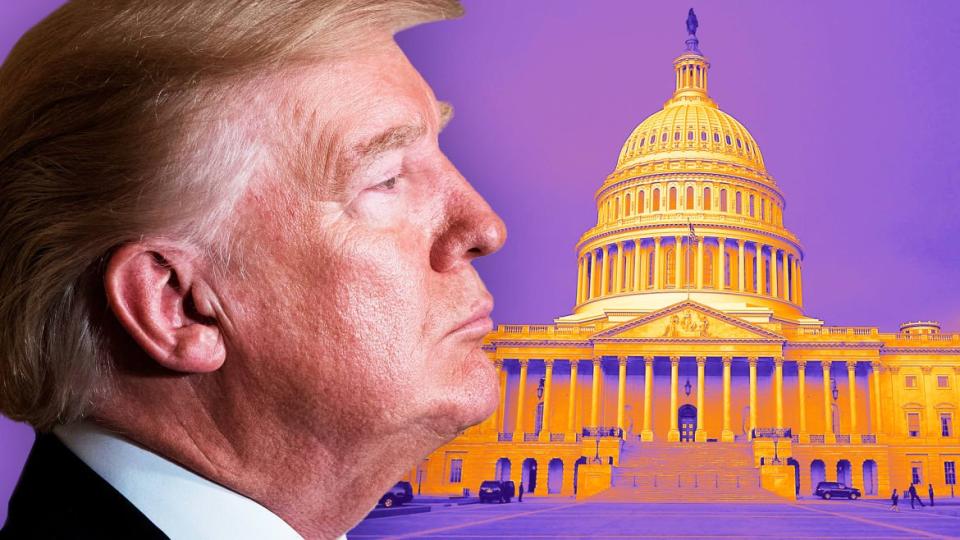Trump’s Gamble: Sue Congress and Run Out the Clock

The federal courts are about to be called upon to adjudicate the most serious conflict between the executive and legislative branches of the federal government since the Watergate era, as President Trump seeks to nullify Congress’ constitutionally grounded right to investigate potential presidential misconduct.
The first court decision in this looming battle between the president and Congress was issued on Monday, when Judge Amit Mehta rejected a Trump effort to quash the House Oversight Committee’s subpoena for Trump financial records held by an accounting firm. It was not a close call. Courts have long recognized the broad “legislative” authority of Congress, an authority that readily extends to inquiries and investigations into potential presidential and executive branch misconduct, such as occurred in Watergate, Iran-Contra, Whitewater, and Benghazi. Trump has asserted that the House has “political” motives and wants to “embarrass” the president; but as Judge Mehta explained, that is legally irrelevant even if it is true. This is because longstanding precedents simply prevent the courts from second-guessing the motives or facially proper legislative purposes of Congress.
In short, this was an easy decision for Judge Mehta, and yet that, curiously, is why the case could well present a serious test for the higher courts, including the Supreme Court.
In light of the weakness of Trump’s arguments, and the clarity of the longstanding governing law, Judge Mehta denied Trump’s motion to stay his decision to afford Trump an opportunity to appeal. The president, however, immediately, and predictably, denounced Judge Mehta as an “Obama-appointed judge”; and on Tuesday his counsel filed a notice of appeal in the D.C. Court of Appeals. Presumably, Trump will also soon seek an emergency stay from that court, and if Trump does not obtain it there, he will likely petition the Supreme Court, including its two recent Trump appointees, for such relief.
Many observers have argued that Congress’ efforts to enforce its subpoenas in the courts will fail, either because the Supreme Court will deny them outright regardless of the merits, or will take so much time to decide the cases that Trump’s stonewalling effort will succeed simply on account of delay. And indeed the federal courts do have a singular ability to take their time to decide cases slowly. A typical civil or criminal appeal can take many months to resolve, and even years in the remote event that a case ends up in the Supreme Court.
Yet the courts, including the Supreme Court, also have the ability to move with expedition in those cases that merit it. Two of the most notable examples occurred during the Nixon administration. In the Pentagon Papers case, the Supreme Court issued a landmark decision days after oral argument rejecting the president’s efforts to bar the publications of a secret government history of the Vietnam War. In U.S. v. Nixon, three weeks after oral argument, the Court ordered enforcement of a grand jury subpoena for the president’s White House tapes. In each of those cases, the Court recognized that failing to reach a timely decision could work a grave injustice, whether by allowing potentially unconstitutional censorship to continue or frustrating the functioning of the law enforcement process.
The Mueller Report Could Be Like the Nixon Tapes
The same is plainly true here. If the courts enter stays upon, or otherwise deny immediate enforcement of, subpoenas, and then allow many months to pass before reaching final decisions upon the validity of Congress’ demands for critical records, evidence and testimony, then Congress’ legislative oversight of the president will be stopped in its tracks, possibly until after the next presidential election and election of a new Congress.
During his confirmation hearing, Chief Justice John Roberts famously said that judges “are like umpires,” who “call balls and strikes,” without taking sides. More recently, he rebuked Trump’s division of the federal judiciary into two partisan teams. “We do not have Obama judges or Trump judges, Bush judges or Clinton judges,” he said in a statement released by the court. “What we have is an extraordinary group of dedicated judges doing their level best to do equal right to those appearing before them.” Roberts added the “independent judiciary is something we should all be thankful for."
Umpires are not supposed to take sides, but neither are they supposed to duck calls, even when tempted to do so. The independence and neutrality of judges is never more starkly tested than when they are called upon to enforce the law in the face of an unconstitutional overreach by the president who appointed them. And if the courts avoid making such a call by failing to issue timely decisions regarding Trump’s efforts to wholly frustrate the oversight efforts of a coordinate branch of government, they will risk becoming aiders and abettors in an audacious presidential challenge to the foundational constitutional principle that the president is answerable to congressional oversight.
Chief Justice Roberts Rebukes Trump. It’s a Warning Shot About Mueller.
Get our top stories in your inbox every day. Sign up now!
Daily Beast Membership: Beast Inside goes deeper on the stories that matter to you. Learn more.
